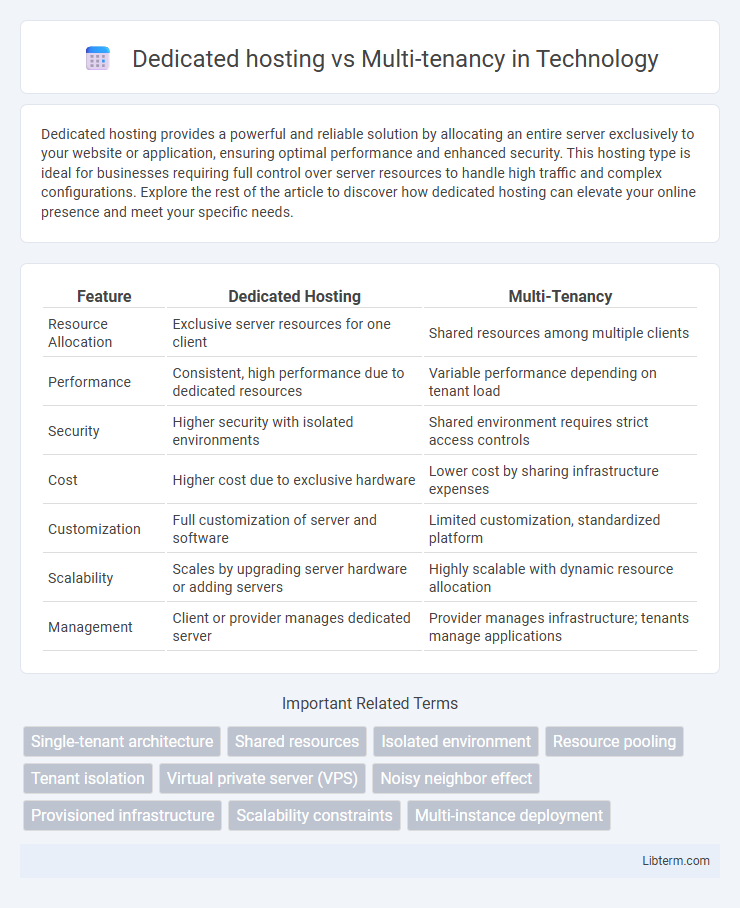Dedicated hosting provides a powerful and reliable solution by allocating an entire server exclusively to your website or application, ensuring optimal performance and enhanced security. This hosting type is ideal for businesses requiring full control over server resources to handle high traffic and complex configurations. Explore the rest of the article to discover how dedicated hosting can elevate your online presence and meet your specific needs.
Table of Comparison
| Feature | Dedicated Hosting | Multi-Tenancy |
|---|---|---|
| Resource Allocation | Exclusive server resources for one client | Shared resources among multiple clients |
| Performance | Consistent, high performance due to dedicated resources | Variable performance depending on tenant load |
| Security | Higher security with isolated environments | Shared environment requires strict access controls |
| Cost | Higher cost due to exclusive hardware | Lower cost by sharing infrastructure expenses |
| Customization | Full customization of server and software | Limited customization, standardized platform |
| Scalability | Scales by upgrading server hardware or adding servers | Highly scalable with dynamic resource allocation |
| Management | Client or provider manages dedicated server | Provider manages infrastructure; tenants manage applications |
Introduction to Dedicated Hosting and Multi-Tenancy
Dedicated hosting provides exclusive server resources to a single client, ensuring optimized performance, enhanced security, and full control over the hosting environment. Multi-tenancy allows multiple users or organizations to share the same server infrastructure while maintaining separate, isolated environments to reduce costs and simplify management. Both hosting models cater to different business needs, with dedicated hosting emphasizing customization and performance, and multi-tenancy focusing on scalability and resource efficiency.
Core Differences Between Dedicated and Multi-Tenant Hosting
Dedicated hosting offers exclusive server resources to a single client, ensuring maximum performance, security, and customization without resource contention. Multi-tenant hosting allows multiple users to share server infrastructure, optimizing costs but potentially leading to variable performance and limited customization due to shared environments. Key differences include resource allocation, security isolation, and control, with dedicated hosting providing isolated, customizable environments while multi-tenancy emphasizes scalability and cost-efficiency through shared resources.
Performance Comparison: Dedicated vs Multi-Tenancy
Dedicated hosting offers superior performance by allocating exclusive server resources such as CPU, RAM, and storage to a single client, eliminating resource contention and ensuring consistent speed and reliability. Multi-tenancy involves multiple users sharing the same infrastructure, which can lead to variable performance due to shared CPU cycles, memory, and bandwidth, especially under high traffic or resource-intensive applications. Businesses requiring high stability and predictable response times often prefer dedicated hosting, while multi-tenancy suits cost-effective scalability with some trade-offs in performance consistency.
Security Considerations for Both Hosting Models
Dedicated hosting provides enhanced security by isolating resources and data on a single physical server, reducing risks of cross-tenant attacks and unauthorized data access. Multi-tenancy, while cost-effective, requires robust virtualization and strict access controls to mitigate vulnerabilities from shared infrastructure and potential data leakage between tenants. Encryption, continuous monitoring, and compliance with security standards such as ISO 27001 and SOC 2 are critical for both hosting models to ensure data integrity and confidentiality.
Cost Analysis: Dedicated Hosting vs Multi-Tenancy
Dedicated hosting incurs higher upfront and maintenance costs due to exclusive resource allocation and hardware management, while multi-tenancy reduces costs by sharing infrastructure across multiple users, maximizing resource utilization. Operational expenses in multi-tenant environments benefit from economies of scale, lowering per-user overhead compared to dedicated hosting's singular focus. Cost efficiency in multi-tenancy is especially advantageous for small to medium-sized businesses seeking scalable solutions without significant capital investment.
Scalability and Flexibility: Which Model Wins?
Dedicated hosting offers superior scalability by allowing businesses to customize resources such as CPU, RAM, and storage based on specific demands, enabling predictable performance under heavy workloads. Multi-tenancy provides flexibility through shared infrastructure, where resources are dynamically allocated among multiple users, facilitating cost efficiency and quick adaptation to varying usage patterns. When evaluating scalability and flexibility, dedicated hosting excels in consistent resource control, while multi-tenancy wins in adaptive resource management and cost-effective scaling.
Customization Capabilities in Dedicated and Multi-Tenant Hosting
Dedicated hosting offers superior customization capabilities, allowing businesses to tailor server configurations, software, and security settings to meet specific performance and compliance requirements. Multi-tenant hosting, by contrast, provides limited customization due to shared resources and standardized environments designed to accommodate multiple users simultaneously. Customization in multi-tenancy is often restricted to application-level settings, whereas dedicated hosting enables full control over the server infrastructure and software stack.
Management and Maintenance Requirements
Dedicated hosting requires intensive management and maintenance by the client, including server configuration, security updates, and hardware troubleshooting, ensuring full control over the environment. Multi-tenancy reduces management burdens as the service provider handles infrastructure maintenance, software updates, and security patches across shared resources. Choosing dedicated hosting offers customization and performance benefits, while multi-tenancy emphasizes scalability and simplified operational overhead.
Ideal Use Cases for Dedicated Hosting vs Multi-Tenancy
Dedicated hosting is ideal for businesses requiring high performance, enhanced security, and maximum control over their server environment, such as financial institutions, e-commerce platforms, and large enterprises handling sensitive data. Multi-tenancy suits startups, small to medium-sized businesses, and SaaS providers seeking cost-effective, scalable solutions with shared infrastructure and simplified maintenance. Organizations prioritizing strict compliance and customized configurations typically choose dedicated hosting, while those focusing on rapid deployment and resource efficiency often opt for multi-tenant architectures.
Choosing the Right Hosting Model for Your Business
Dedicated hosting offers exclusive server resources and enhanced security, ideal for businesses with high traffic and strict compliance requirements. Multi-tenancy provides cost-effective scalability by sharing resources among multiple users, suitable for startups and growing companies with variable workloads. Assessing budget, performance, security needs, and long-term growth plans is crucial in selecting the right hosting model for your business success.
Dedicated hosting Infographic

 libterm.com
libterm.com